Sept. 4 update on COVID-19 in MN: 10 more deaths; 856 new cases

Go Deeper.
Create an account or log in to save stories.
Like this?
Thanks for liking this story! We have added it to a list of your favorite stories.
Updated 11:50 a.m.
Minnesota’s steep climb in new COVID-19 cases continues. The Health Department on Friday reported another 856 newly confirmed infections, and 10 more deaths.
The count of people currently in the hospital (274) stayed roughly stable from Thursday; 138 people are in intensive care. Daily hospitalizations are down significantly from late May but have stayed stubbornly consistent the past six weeks at around 300 patients on average.
While hospitalizations have plateaued, the recent daily jumps in newly confirmed cases led health authorities to sound the alarm this week that the state is on the wrong path as fall turns to winter and that Minnesotans must stay vigilant, wearing masks and socially distancing even at casual meetups with friends and family.
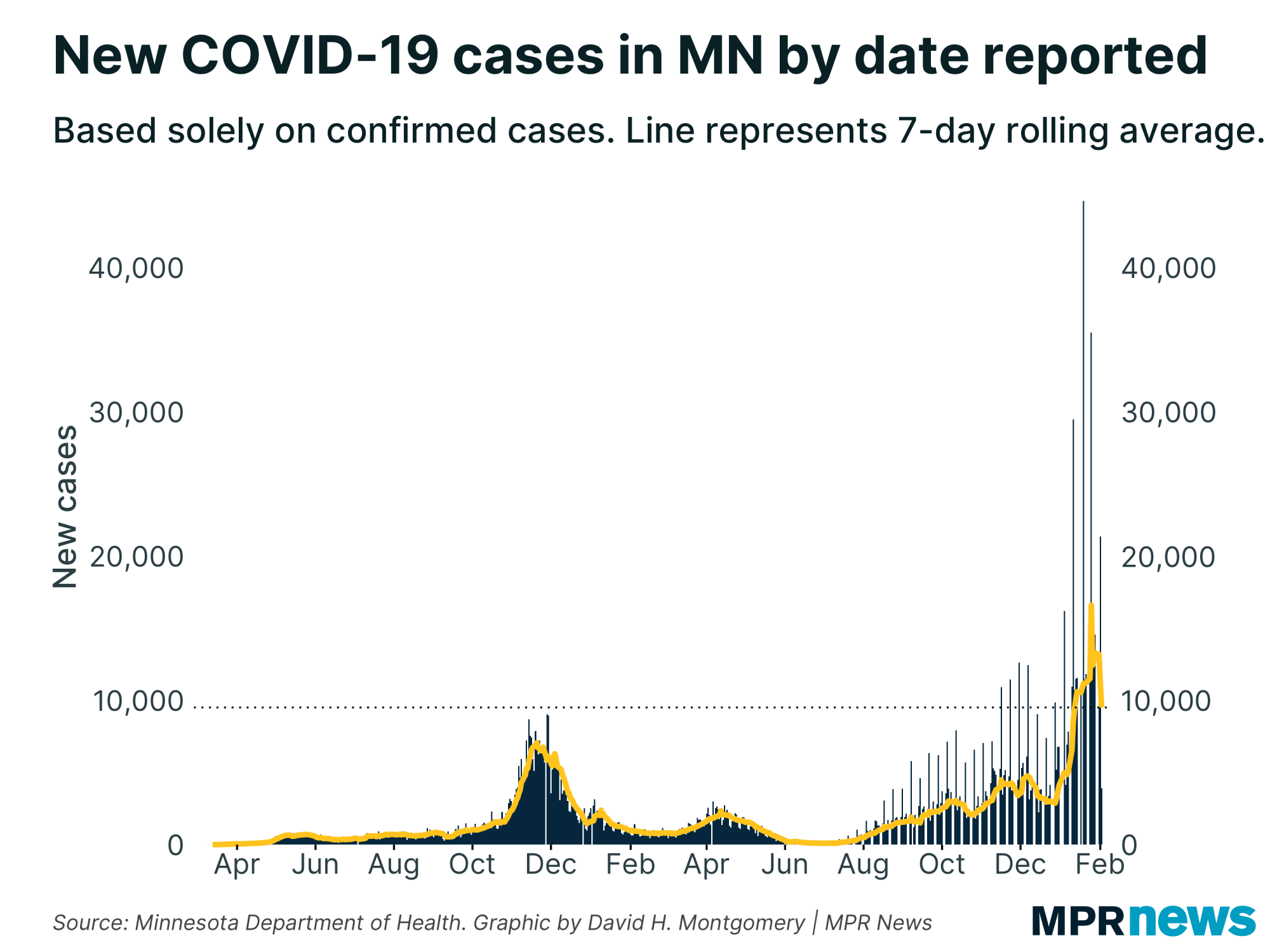
Gov. Tim Walz joined that chorus on Thursday, warning Minnesota sits at a “tipping point” in the pandemic and risks outbreaks similar to what’s been seen in Arizona.
Turn Up Your Support
MPR News helps you turn down the noise and build shared understanding. Turn up your support for this public resource and keep trusted journalism accessible to all.
Minnesota currently has more than 6,000 active, confirmed cases, a record in the outbreak, although the number (confirmed and unconfirmed) was likely higher in May when testing was much lower.
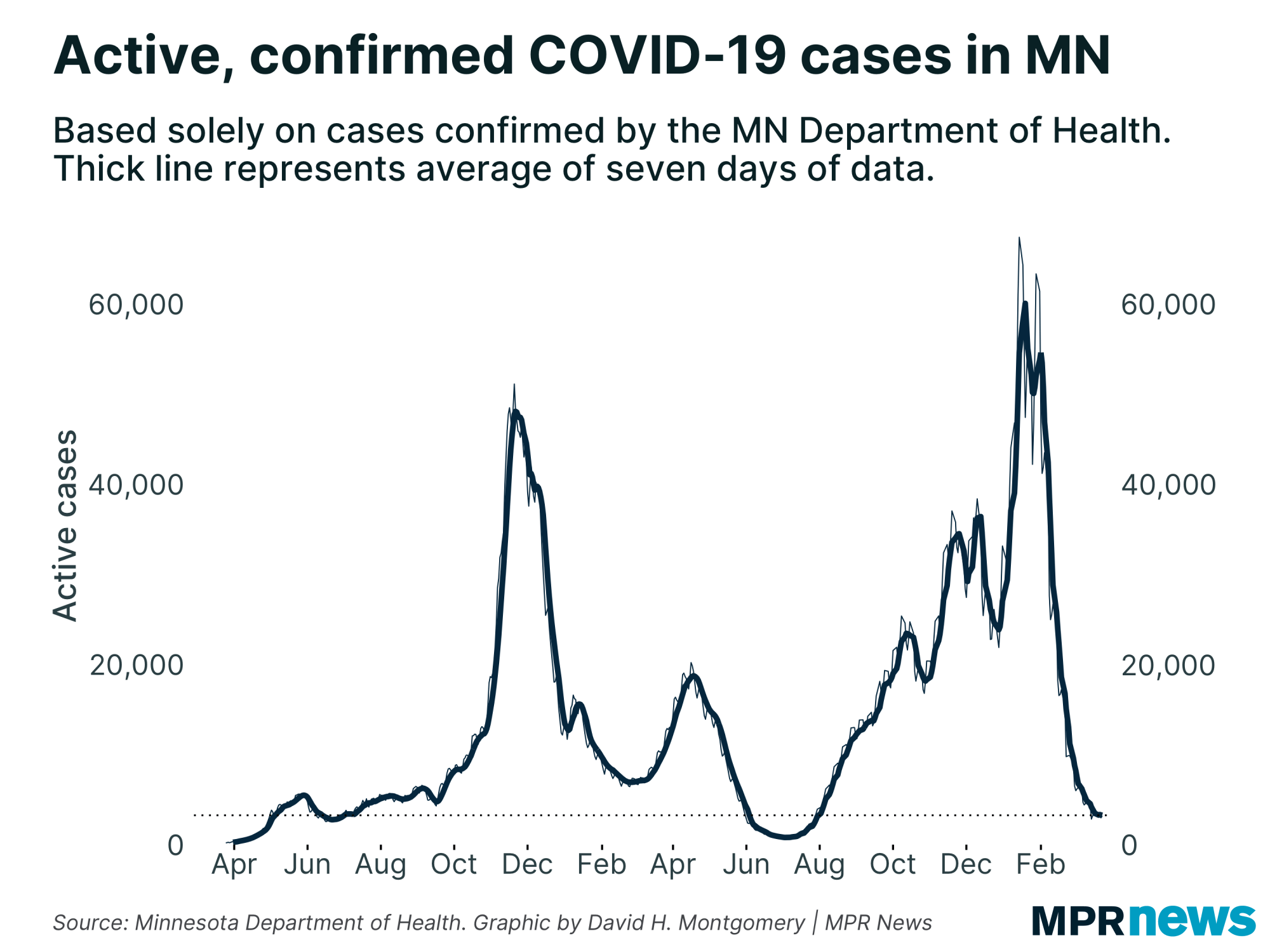
Among the 78,966 total confirmed cases since the pandemic began, 89 percent of those diagnosed have recovered to the point they no longer need to be isolated.
Of the 1,847 in Minnesota who’ve died, about 73 percent had been living in long-term care or assisted living facilities; most had underlying health problems.
20-somethings, suburbs, southern Minnesota
With newly confirmed cases rising steeply the past few weeks and college students and kids returning to school, officials are increasingly concerned Minnesotans have numbed to the need to stay vigilant, opening the door to more spread.
Young adults are a particular concern.
People in their 20s make up the age bracket with the state’s largest number of confirmed cases — more than 18,000 since the pandemic began, including more than 10,000 among people ages 20-24.
They are driving the current outbreaks, although the number of high school-age children confirmed with the disease is also growing, topping 7,000 cases for children 15 to 19 years old.
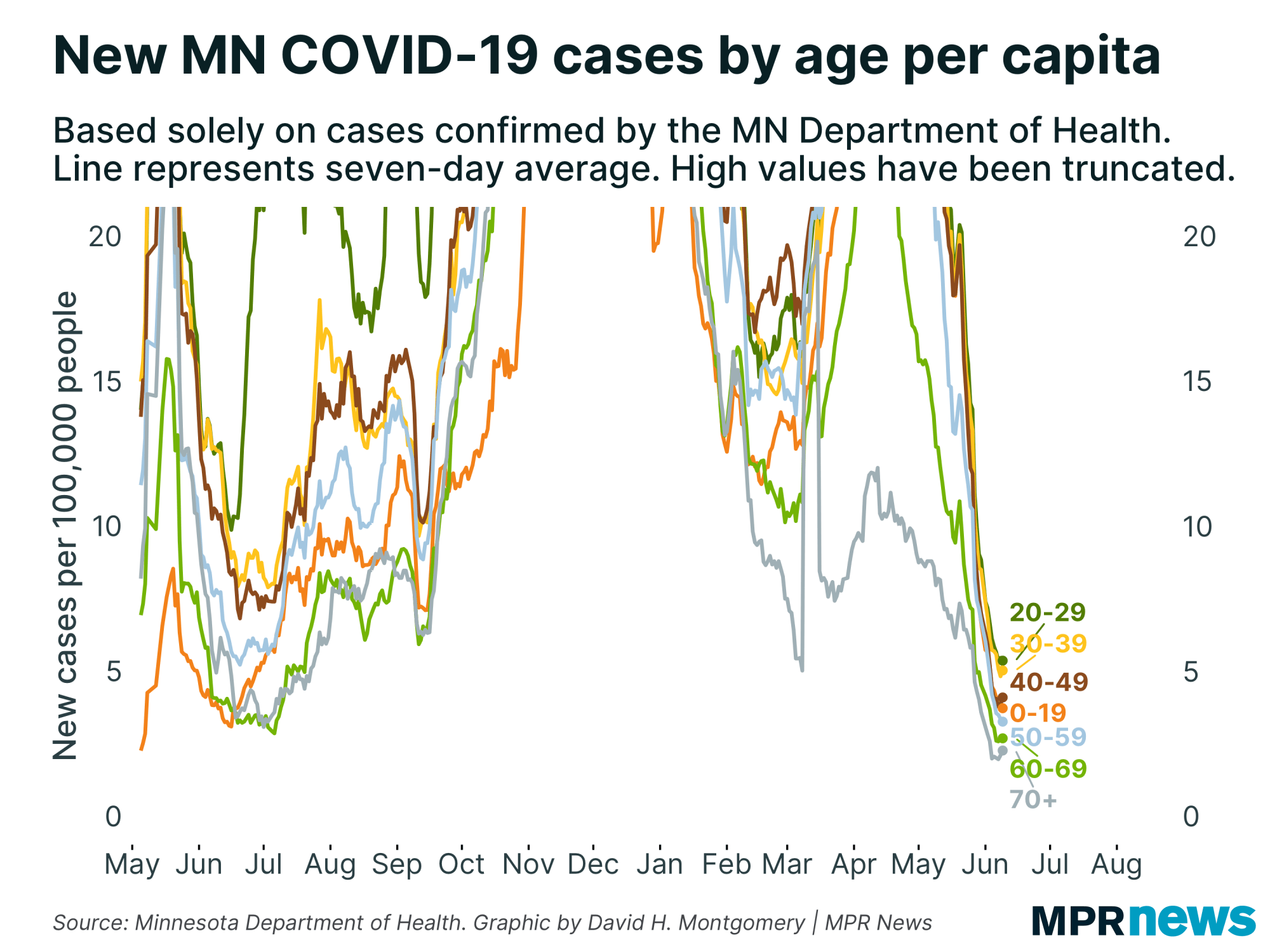
While less likely to feel the worst effects of the disease, experts worry youth and young adults will spread it to grandparents and other vulnerable populations and that such outbreaks could cripple attempts to reopen campuses completely to in-person teaching.
Earlier this week, health authorities noted a spike in Winona County they attribute to college-age people returning to schools there. Winona State University and St. Mary's University are based in Winona. The city also has a Minnesota State College Southeast campus.
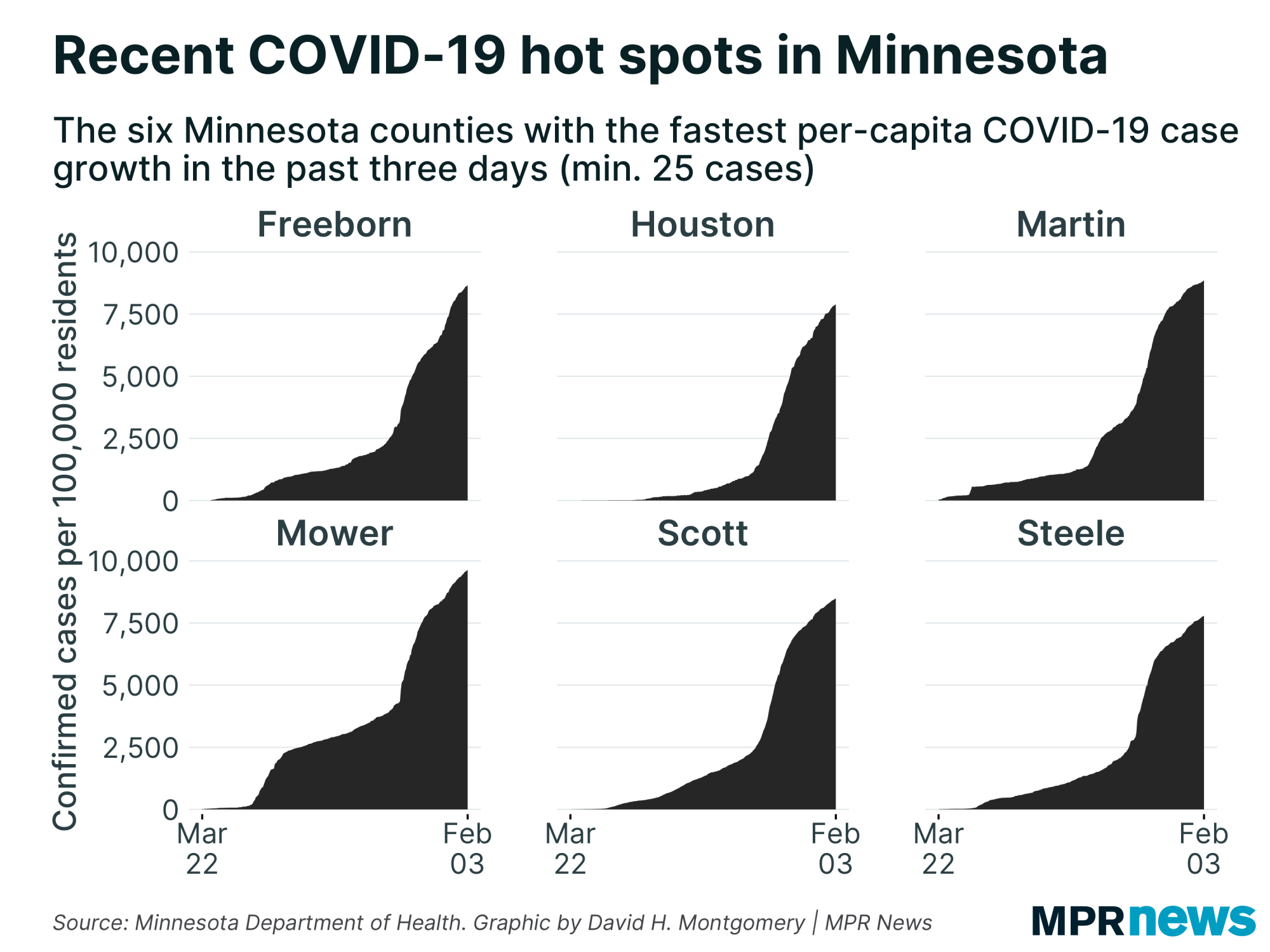
Regionally, the Twin Cities and suburbs had been driving the counts of newly reported cases. This week’s data, however, show new cases exploding everywhere except Hennepin and Ramsey counties. The numbers also show cases climbing in southern and central Minnesota.
Friday’s numbers showed that trend continuing.
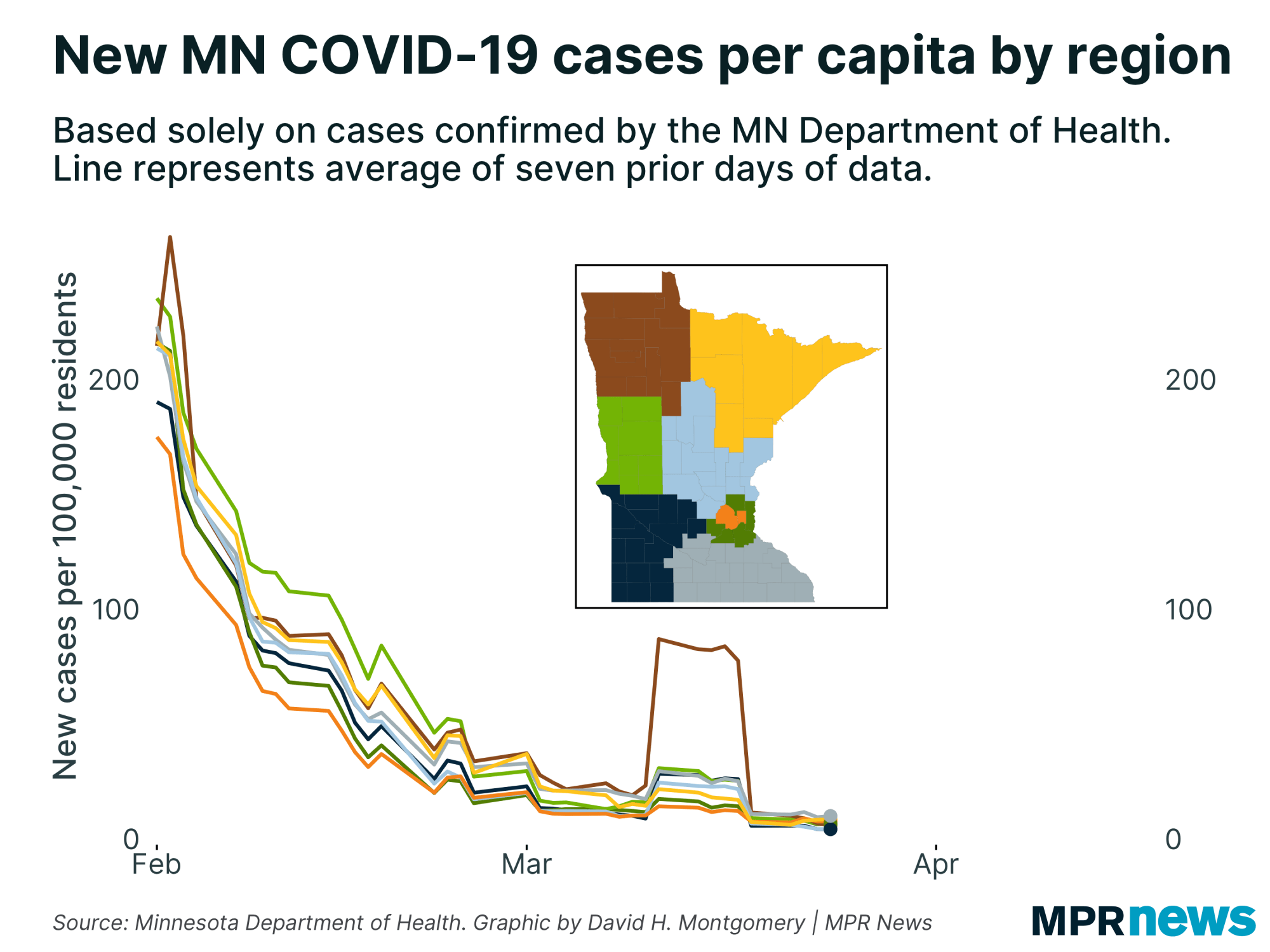
Minnesotans’ behavior in stores, restaurants and other public places isn’t so much the problem now, but “informal gatherings have really proven to be a weak spot in our response to the pandemic,” Health Commissioner Jan Malcolm said this week.
She reiterated that on Thursday, noting that case surges early on in the pandemic could be easily traced to meatpacking plants and other easily identified points of origin, but that’s not the case in the current surge.
About one-third of new cases now are now coming from community spread of unknown origin, higher than just before the last major holiday that brought Minnesotans together, the Fourth of July.
“We’re in a more precarious situation today” compared to then, Malcolm said. “There is risk in this situation. The virus is all over the state. The outbreaks are happening all over the state … and we just want people to be vigilant.”
‘None of us is an island’
Those trends have become worrisome enough for Walz to warn Minnesotans to change their behavior or risk a return to more restrictions on daily life.
“My goal is to keep as much open as we have right now, to not have to turn the dial backwards,” Walz told reporters Thursday ahead of the upcoming Labor Day holiday officials fear will accelerate that surge of outbreaks across the state fueled by informal gatherings.
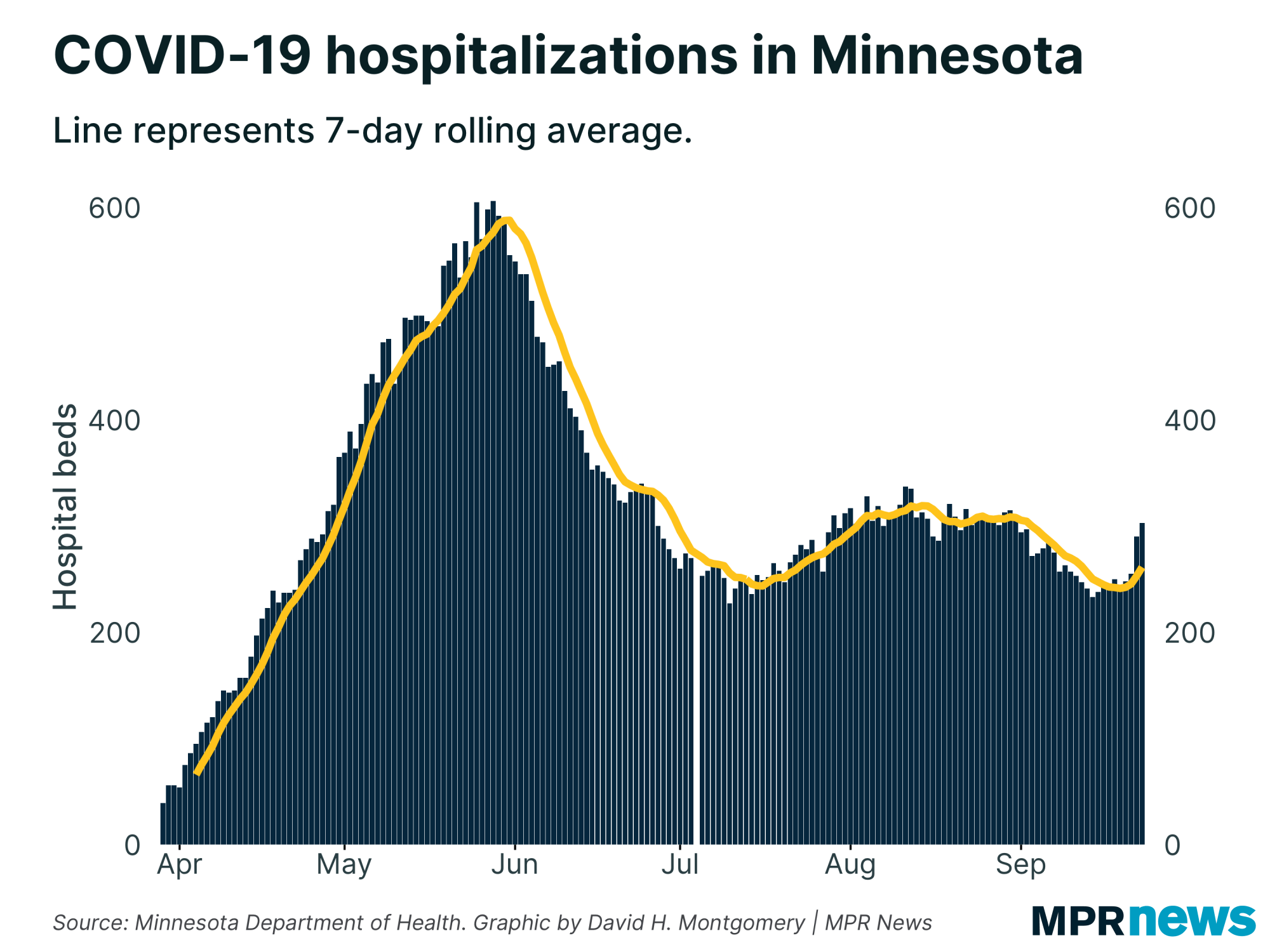
State authorities hammered that point home Thursday.
Kris Ehresmann, the state’s infectious disease director, said Health Department analysts know of 56 cases scattered over nine counties tied to a wedding in southwestern Minnesota attended by 275 guests, with many not taking precautions.
There appears to be more than the 56 cases, Ehresmann said, but some attendees have chosen not to get tested to avoid driving up the official infection rate. Those known to be infected include educators and long-term care workers.
Last week, regional health authorities in southwestern Minnesota reported on a cluster of COVID-19 cases from a large wedding in Ghent, in Lyon County on Aug. 22, although it wasn’t clear if this was the wedding Ehresmann was discussing.
Investigators, she added, are also following up on a cluster of illnesses at a wedding that was attended by someone who’d also gone to the massive Sturgis, S.D., motorcycle rally. The Aug. 7-16 rally drew some 460,000 people from across the country. Most people didn't take significant precautions against COVID-19 infections.
Officials here have already confirmed 50 direct cases in Minnesota tied to Sturgis, with one death.
"During a pandemic, one person's actions and decisions don't just affect themselves. They affect those around them, at work, at home and everywhere they go," Ehresmann added. "The bottom line is none of us is an island."
Walz said while he wasn’t adding new restrictions now, he and his commissioners are in a regular discussion about the need to balance economic and public health concerns as they track the disease.
“The virus will dictate where we go,” he said, acknowledging that new restrictions would further damage restaurants, bars and other businesses that depend on people gathering in public spaces.
“We believe that the behavioral changes, the mask mandate and maybe another push on this can make the difference,” he added.
Developments around the state
Mall of America cuts 200 jobs
The Mall of America said Thursday that it plans to cut more than 200 jobs.
The Bloomington megamall was forced to close for three months at the start of the pandemic.
It reopened at limited capacity in June, but has struggled financially.
In a legally-mandated letter to the Minnesota Department of Employment and Economic Development, managers say they plan to cut 211 positions permanently by the end of the month.
Furloughs for another 178 employees could continue beyond Sept. 30.
In a statement, mall spokesperson Dan Jasper says managers hope to reinstate the furloughed workers when business conditions allow.
— Matt Sepic | MPR News
Walz, Gazelka chat over COVID-19, emergency powers
DFL Gov. Tim Walz and Republican Senate Majority Leader Paul Gazelka held a private meeting Thursday to try to iron out their differences over the state’s COVID-19 response.
Walz is expected to seek another extension of the emergency, even though Gazelka and other Republicans say it's gone on too long.
“It’s going to be almost a half a year, a half a year of emergency powers with no end in sight. So, that‘s why we’re asking him to come up some parameters so we know what is the pathway out of here,” Gazelka said. “So that the legislative branch can work together with the governor, rather than the governor having all of the decision-making.”
Still, Gazelka believes they can find common ground moving forward to help businesses and schools.
“I think we should take it seriously. But at the same time, we have to measure all these businesses closing, kids not in school. What are we going to do about those issues as well?”
Both Gazelka and Walz said the meeting was positive. But Walz stressed that the emergency is not over.
“We’re learning a lot of COVID-19. The one thing is it does not follow our timeline,” Walz said.
— Tim Pugmire | MPR News
Top headlines
Minnesota Supreme Court expected to expedite voter-aid case: Justices will decide if a pair of laws covering the level of assistance permitted for voters will remain active or be suspended. A lower court halted enforcement. The case is one in a sprawling battle over the way the 2020 election will be conducted.
COVID-19 looms over sugarbeet harvest: Sugarbeet growers and processors hire thousands of workers each year of the harvest. This year they need to protect them from COVID-19 to ensure the harvest is brought in.
At least 12 states report coronavirus cases linked to Sturgis rally: More than two weeks after nearly half a million bikers flocked to South Dakota, the tally of coronavirus infections traced back to the Sturgis Motorcycle Rally has surpassed 260, an estimate that is growing steadily as more states report cases, with the first known COVID-19 death of an attendee reported in Minnesota.
COVID-19 in Minnesota
Data in these graphs are based on the Minnesota Department of Health's cumulative totals released at 11 a.m. daily. You can find more detailed statistics on COVID-19 at the Health Department website.


